#11 10-Aug-2005 Four varieties of Canadian Jewish Congress criminality
@
#12 10-Oct-2005 Mistaken relevance of the Kilikov Trial parable
Letters relating to Ed Morgan:
@
Paul Martin
10-Mar-2004 What kind of Justice Minister have you appointed?
@
Irwin Cotler
13-Mar-2004 Who's afraid of holocaust denial?
@
Paul Martin
14-Mar-2004 American war crimes
@
Paul Martin
15-Mar-2004 Italian War Crimes
@
Paul Martin
16-Mar-2004 Still more Jewish war crimes
@
Paul Martin
25-Mar-2004 Irwin Cotler collaboration with Steven Rambam
@
Paul Martin
04-Apr-2004 Legacy of disenfranchising Ukrainians, Germans, and Lithuanians
@
Paul Martin
27-Apr-2004 Irwin Cotler Leadership in the Deschenes Commission Witch Hunt
@
Paul Martin
02-May-2004 Comparing American-British with Ukrainian war crimes
@
Paul Martin
14-May-2004 Please dismantle the CHRC hate-messaging unit
@
Paul Martin
19-May-2004 What David Zimet tells us about Irwin Cotler
@
Mary M Gusella
27-May-2004 Lubomyr Prytulak Reply to Hannya Rizk Investigator's Report
@
Paul Martin
02-Jun-2004 Irwin Cotler and the CHRC: Two albatrosses around your neck
@
Irwin Cotler
03-Jun-2004 Please address the issue of Jewish men trafficking Ukrainian women
@
Paul Martin
07-Jun-2004 Does Irwin Cotler reach out to women?
@
Paul Martin
12-Jun-2004 Will the Liberal government criminalize investigation of archeological forgeries?
@
Paul Martin
13-Jun-2004 Canadians want to live without fear
@
Paul Martin
14-Jun-2004 Anne McLellan too drags you down
@
Paul Martin
15-Jun-2004 You are sending the electorate mixed signals
@
Paul Martin
19-Jun-2004 Canadian Jewish Congress Criminal Conspiracy Under The Competition Act
@
Anne McLellan
27-Jun-2004 Anne McLellan shrugs off Will Zuzak's complaint of minority-group persecution
@
Paul Martin
18-Oct-2004 Stage III: Irwin Cotler's Ukrainian Archive Bill
@
Lucie Veillette
20-Oct-2004 CHRC Decision to Deal With CJC Complaint
@
Lubomyr Prytulak
20-Oct-2004 Reply To CHRC Decision To Deal With CJC Complaint
@
Irwin Cotler
27-Oct-2004 IRWIN COTLER FOR PARLIAMENTARY CENSOR? VOTE NO!
@
Irwin Cotler
28-Oct-2004 Why does Parliament shun you?
@
Paul Martin
10-Nov-2004 Three reasons why al-Qaeda might attack Canada
@
Paul Martin
07-Jul-2005 Protecting Canada From Terrorist Attack: What Countries is Canada's Justice Minister Citizen Of?
@
Paul Martin
11 Aug 2005 How Jane Stewart might have prevented the American Revolution
@
Paul Martin
17-Aug-2005 What Oreo cookies and Campbell's Vegetable Soup tell us about Canadian Jewish Congress criminality
@
Paul Martin
24-Aug-2005 Sometimes a complaint of cruelty to animals is occasioned by cruelty to animals
@
Paul Martin
02-Sep-2005 Deuteronomy does not mandate the kosher certification of dog food
@
Paul Martin
05-Sep-2005 If Deuteronomy forbids riding camels, will the Canadian Jewish Congress kosher-certify air?
@
Irwin Cotler
19-Sep-2005 Were you really Nelson Mandela's lawyer?
@
Irwin Cotler
25-Sep-2005 Were you really Andrei Sakharov's lawyer?
@
Irwin Cotler
27-Sep-2005 Were you really Natan Sharansky's lawyer?
@
Lucie Veillette to Lubomyr Prytulak
13-Sep-2005 On to the Canadian Human Rights Tribunal
@
Lucie Veillette to Lubomyr Prytulak
21-Sep-2005 The Disposition Committee was not allowed to see the Prytulak Comment
@
Lubomyr Prytulak to Mary M Gusella
03-Oct-2005 Concealment, followed by confession, of CHRC spoliation
Canadian Jewish Congress (CJC) complaint to the
Canadian Human Rights Commission (CHRC) of
Ukrainian Archive (UKAR) "hate messaging":
@
Canadian Human Rights Commission INDEX
Eppur si muove!
exclaimed unrepentent Geocentrism Denier and Scientific Revisionist
Galileo Galilei (1564-1642)
toward the end of his trial by the Inquisition in 1633
(first posted 02-Feb-2004, last revised 03-Feb-2004)
|
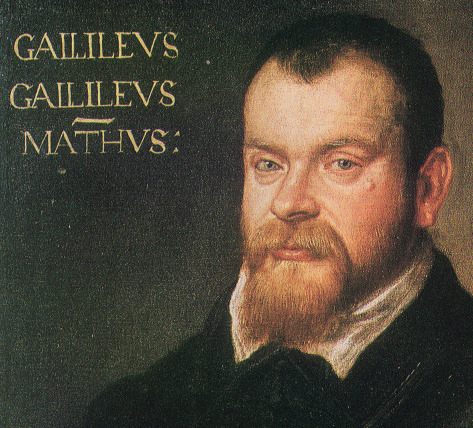
|
|
Galileo attracted the condemnation of the Catholic church for advocating the Copernican or Heliocentric theory (that the sun is the center around which the earth revolves) in preference to the older Ptolemaic or Geocentric theory (that the earth is the center around which the sun revolves, as does to the uneducated mind seem to be the case), for which heresy Galileo was tried by the Inquisition, sentenced to life imprisonment, and had his work suppressed. In exchange for his public recantation, however, Galileo's sentence was commuted to life under house arrest. It is commonly reported that as Galileo rose from his knees after his recantation, he muttered under his breath his unshaken conviction concerning the earth, "Eppur si muove!" � "But it does move!" Although no evidence exists that Galileo did really utter these words, little harm is done in perpetuating the story as a conjecture, as such must have been his thought.
The Catholic Encyclopedia admits that the Galileo persecution was a "grave and deplorable error," and a "miscarriage of justice," but feels that the church is unfairly injured by too much being made of it, pointing out that every justice system errs, as is demonstrated by the frequency of reversal of judgments upon appeal, and every justice system occasionally suffers a miscarriage, all without the institution being disparaged the way the Catholic church has been (www.newadvent.org/cathen/13598b.htm). However, such Catholic minimization overlooks, among other things, that on 26-Feb-1616, Galileo was enjoined from so much as discussing Heliocentrism with anybody, either orally or in writing, which shatters the image of a Catholic church as interested as Galileo himself in discovering the truth, but which for a time came to a conclusion opposite to Galileo's, based on its interpretation of the available evidence. And the Catholic minimization overlooks also the lethargy of the Catholic reversal of its error, where the 1633 entry of Galileo's Dialogue Concerning the Two Chief World Systems in the Index of Prohibited Books was not removed until 1835, and where the Inquisition's initial 1616 condemnation of Galileo was not reversed until 1992. Piecemeal reversals of so notorious a judgment arriving two or three centuries late seem to point less to a regretted error than to the church's unyielding hostility to science, an allegation which the church vehemently denies, and not without substantial evidence which does succeed in discomposing any unqualified stereotype of Catholic opposition to science:
It is in the first place constantly assumed, especially at the present day, that the opposition which Copernicanism encountered at the hands of ecclesiastical authority was prompted by hatred of science and a desire to keep the minds of men in the darkness of ignorance. To suppose that any body of men could deliberately adopt such a course is ridiculous, especially a body which, with whatever defects of method, had for so long been the only one which concerned itself with science at all. It is likewise contradicted by the history of the very controversy with which we are now concerned. According to a popular notion the point, upon which beyond all others churchmen were determined to insist, was the geocentric system of astronomy. Nevertheless it was a churchman, Nicholas Copernicus, who first advanced the contrary doctrine that the sun and not the earth is the centre of our system, round which our planet revolves, rotating on its own axis. His great work, "De Revolutionibus orblure coelestium", was published at the earnest solicitation of two distinguished churchmen, Cardinal Schömberg and Tiedemann Giese, Bishop of Culm. It was dedicated by permission to Pope Paul III in order, as Copernicus explained, that it might be thus protected from the attacks which it was sure to encounter on the part of the "mathematicians" (i.e. philosophers) for its apparent contradiction of the evidence of our senses, and even of common sense. He added that he made no account of objections which might be brought by ignorant wiseacres on Scriptural grounds. Indeed, for nearly three quarters of a century no such difficulties were raised on the Catholic side, although Luther and Melanchthon condemned the work of Copernicus in unmeasured terms. Neither Paul III, nor any of the nine popes who followed him, nor the Roman Congregations raised any alarm, and, as has been seen, Galileo himself in 1597, speaking of the risks he might run by an advocacy of Copernicanism, mentioned ridicule only and said nothing of persecution. Even when he had made his famous discoveries, no change occurred in this respect. On the contrary, coming to Rome in 1611, he was received in triumph; all the world, clerical and lay, flocked to see him, and, setting up his telescope in the Quirinal Garden belonging to Cardinal Bandim, he exhibited the sunspots and other objects to an admiring throng.
Catholic Encyclopedia, Galileo Galilei www.newadvent.org/cathen/06342b.htm
|
As broached in the quotation immediately above, then, it is particularly destructive of the stereotype of the Catholic church blindly opposing the advancement of science that the Heliocentric theory was first disseminated by the Catholic cleric Copernicus a hundred years before Galileo was tried by the Inquisition in 1633, and that the Catholic church supported the Copernican Heliocentric revolution over its first three quarters of a century. Why, then, was Galileo persecuted for a theory that the church had itself given birth to and long nurtured? The answer may be that Galileo was not content to modestly aim his writing at a few professional readers � rather, he energetically proselytized:
In spite of all deficiency in his arguments, Galileo, profoundly assured of the truth of his cause, set himself with his habitual vehemence to convince others, and so contributed in no small degree to create the troubles which greatly embittered the latter part of his life.
Catholic Encyclopedia, Galileo Galilei
www.newadvent.org/cathen/06342b.htm
|
And on top of that, Galileo allied himself with individuals and movements that confronted and threatened the church by undermining the authority of scripture in the eyes of the masses:
But what, more than all, raised alarm was anxiety for the credit of Holy Scripture, the letter of which was then universally believed to be the supreme authority in matters of science, as in all others. When therefore it spoke of the sun staying his course at the prayer of Joshua, or the earth as being ever immovable, it was assumed that the doctrine of Copernicus and Galileo was anti-Scriptural; and therefore heretical. It is evident that, since the days of Copernicus himself, the Reformation controversy had done much to attach suspicion to novel interpretations of the Bible, which was not lessened by the endeavours of Galileo and his ally Foscarini to find positive arguments for Copernicanism in the inspired volume. Foscarini, a Carmelite friar of noble lineage, who had twice ruled Calabria as provincial, and had considerable reputation as a preacher and theologian, threw himself with more zeal than discretion into the controversy, as when he sought to find an argument for Copernicanism in the seven-branched candlestick of the Old Law. Above all, he excited alarm by publishing works on the subject in the vernacular, and thus spreading the new doctrine, which was startling even for the learned, amongst the masses who were incapable of forming any sound judgment concerning it. There was at the time an active sceptical party in Italy, which aimed at the overthrow of all religion, and, as Sir David Brewster acknowledges (Martyrs of Science), there is no doubt that this party lent Galileo all its support.
Catholic Encyclopedia, Galileo Galilei
www.newadvent.org/cathen/06342b.htm
|
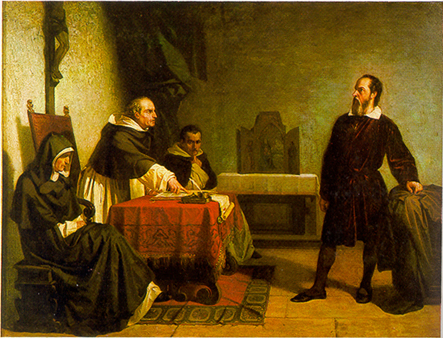 Galileo interrogated by Inquisitors in 1616
Galileo interrogated by Inquisitors in 1616
|
|
The answer as to why the Catholic church first protected and later attacked Copernican Heliocentrism, then, might resemble the answer arrived at following a consideration of Padre Pio's stigmata, where it was concluded that church personnel are not homogeneous, some being more committed to truth even at the sacrifice of income, and others being more committed to income even at the sacrifice of truth. From Copernicus's work, the church foresaw on the one hand no appreciable loss of income, and on the other hand an impressive and admirable advancement of knowledge, which strengthened the position of the truth-maximizing priesthood over the income-maximizing priesthood. However, once Galileo supplemented his scholarship with publicity, and once he associated himself with a movement to overthrow all religion, the priesthood could foresee an undermining of the authority of scripture in the eyes of the public, a weakening of faith, a decrease in adherents, and a plunge in revenues, which gave ascendency to the income-maximizing priesthood over the truth-maximizing priesthood. The Catholic church, like all human institutions, and indeed like every human, contains both good and evil in perpetual struggle for ascendancy: "Gradually it was disclosed to me that the line separating good and evil
passes not through states, nor between classes, nor between political
parties � but right through every human heart � and all human hearts" � Alexander Solzhenitsyn.
Thus, although it is indeed preposterous to imagine, as the Catholic Encyclopedia rightly points out above, that "ecclesiastical authority was prompted by hatred of science and a desire to keep the minds of men in the darkness of ignorance"; it is not preposterous to imagine that ecclesiastical authority was prompted by an anticipated loss of revenue and of power; the second of these two alternatives, however, devolving into the first, because revenue and power could only be maintained by keeping "the minds of men in the darkness of ignorance."
 Galileo tried by the Inquisition in 1633
Galileo tried by the Inquisition in 1633
|
The Canadian Jewish Congress persecutions of today demonstrate that the political machinations of what might appear to be the backward and benighted early 1600's have not changed profoundly over the ensuing three and three-quarters centuries, and that yesterday's role of Pope Urban VIII is today being played in a different context but to the same effect by Ed Morgan � the role of the leader of an attempt to suppress knowledge because the dissemination of that knowledge diminishes revenues. However, the world has changed, and heresy suppression today is not the easy matter that it was then, and yesterday's Inquisition was a more powerful body than today's Canadian Human Rights Commission, and there were not the free press and Internet then that there are today, nor the same protection of free speech and respect for individual liberties, and so what worked for Pope Urban VIII to the discredit of the Catholic church may not work for Canadian Jewish Congress Chair Ed Morgan, thus sparing the Canadian Jewish Congress further disgrace, and thus demonstrating the paradox that failure can be success, failure for the incumbent Canadian Jewish Congress leadership being success for the shadow Canadian Jewish Congress leadership, and being especially success for the Jewish people, as the Canadian Jewish Congress today works against the interests of Canadian Jewry and of World Jewry.
Actually, in a comparison of Pope Urban VIII in 1633 and CJC Chair Ed Morgan today, or in a comparison of the Catholic Inquisition of that distant era with the Canadian Jewish Congress of today, the pope and his Inquisition come out as the more enlightened and just, as neither of them ever argued that Galileo should be condemned and his work suppressed whether Galileo was right or wrong and whether his work was true or false, or without hearing Galileo's defense. Rather, the Inquisitors concerned themselves with the truth of the Heliocentric theory, provided Galileo with every opportunity to defend it, and only afterward concluded that the evidence in its favor was insufficient, a conclusion that even modern observers like Thomas Henry Huxley, President of the Royal Society, find reasonable:
It was not until four years later that trouble arose, the ecclesiastical authorities taking alarm at the persistence with which Galileo proclaimed the truth of the Copernican doctrine. That their opposition was grounded, as is constantly assumed, upon a fear lest men should be enlightened by the diffusion of scientific truth, it is obviously absurd to maintain. On the contrary, they were firmly convinced, with Bacon and others, that the new teaching was radically false and unscientific, while it is now truly admitted that Galileo himself had no sufficient proof of what he so vehemently advocated, and Professor Huxley after examining the case avowed his opinion that the opponents of Galileo "had rather the best of it".
Catholic Encyclopedia, Galileo Galilei www.newadvent.org/cathen/06342b.htm
|
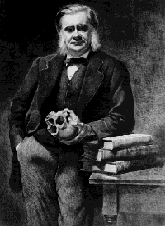 "The Pope and the College of Cardinals had rather the best of it." � Thomas Henry Huxley
"The Pope and the College of Cardinals had rather the best of it." � Thomas Henry Huxley
|
|
Huxley's "had rather the best of it" opinion quoted above may be less substantial than it seems � though made by a prestigious and credible personage, it may have been more a casual remark based on an impression than the conclusion of in-depth research. It can be found in a Huxley letter dated 12-Nov-1885 at aleph0.clarku.edu/huxley/letters/85.html, embedded in no more than the single sentence on the subject, "I looked into the matter when I was in Italy, and I arrived at the conclusion that the Pope and the College of Cardinals had rather the best of it." This is far from corroborating that the Inquisitors were right to judge Galileo's Heliocentrism as insufficiently founded, but it does suggest that the Inquisition methodology was modern to the extent that it consisted of hearing both sides in an effort to ascertain the truth.
|
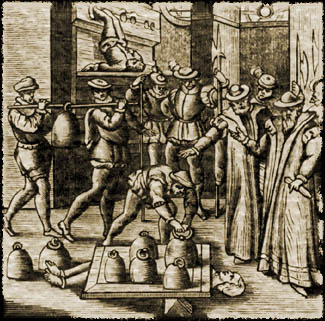 "If we are to have torture, it should be authorized by the law." � Alan Dershowitz
"If we are to have torture, it should be authorized by the law." � Alan Dershowitz
|
In this regard it might be concluded that if one were seeking justice, one might get more of it from the Inquisitors of four to five centuries ago than from the Canadian Jewish Congress of today � at least the Inquisitors regarded the establishment of truth as central, and respected the principle of Audi alteram partem � Hear the other side � whereas the Canadian Jewish Congress does neither, thereby revealing a fanatical absolutism that might have made even Galileo's Inquisitors roll their eyes in disbelief. One may wonder whether going back several more centuries into the Dark Ages would discover any system of justice as backward as what the Canadian Jewish Congress attempts to foist on the Canadian people, or whether even in the Dark Ages the degree of enlightenment was too advanced to permit it. Trial by ordeal and trial by combat are in a sense more primitive, but at least they offer some opportunity for vindication, whereas a Canadian Jewish Congress proceeding does not; and at least they can be credited with aiming to determine the truth, though making the mistake of relying on superstition to do so; and at least they can be credited with allowing the respective parties the opportunity to influence the outcome, though again relying on superstition � such that even the advocates of trial by ordeal or by combat might be baffled by the Canadian Jewish Congress lack of interest in truth and its denial of input to the disfavored party. It may be the case that the equivalent of a Canadian Jewish Congress trial is to be found not by going back in time within Western civilization, but rather is to be found by travelling to totalitarian lands � the modus operandi that the Canadian Jewish Congress advocates resembles more than anything else a Stalinist show trial.
That the Galileo Inquisitors were capable of torture, and may have threatened Galileo with torture, is a very large remaining difference favoring the Canadian Jewish Congress, but this is a difference that may be smaller than it seems, as Israel tortures unreservedly and unflaggingly, and Israel is supported by both Ed Morgan and by the Canadian Jewish Congress; and what difference in attitude to torture there remains between Israel and the Canadian Jewish Congress may be narrowing, as Zionist law professor Alan Dershowitz of Harvard University has already advocated the use of torture warrants on our side of the Atlantic: "If we are to have torture, it should be authorized by the law" (Boston Phoenix, 26-Nov-2001 at www.bostonphoenix.com/boston/news_features/daily/documents/02024391.htm).
HOME
DISINFORMATION
CHRC
60 MINUTES
PEOPLE
ABELLA
COTLER
FARBER
MARTIN
MORGAN
RAMBAM
RONEN
KOSHER TAX
LVIV MASSACRE
LA JUSTICE
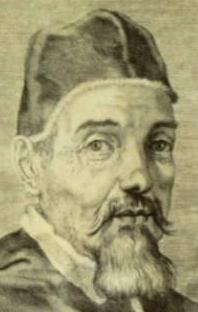


 Galileo interrogated by Inquisitors in 1616
Galileo interrogated by Inquisitors in 1616
 Galileo tried by the Inquisition in 1633
Galileo tried by the Inquisition in 1633
 "The Pope and the College of Cardinals had rather the best of it." � Thomas Henry Huxley
"The Pope and the College of Cardinals had rather the best of it." � Thomas Henry Huxley
 "If we are to have torture, it should be authorized by the law." � Alan Dershowitz
"If we are to have torture, it should be authorized by the law." � Alan Dershowitz